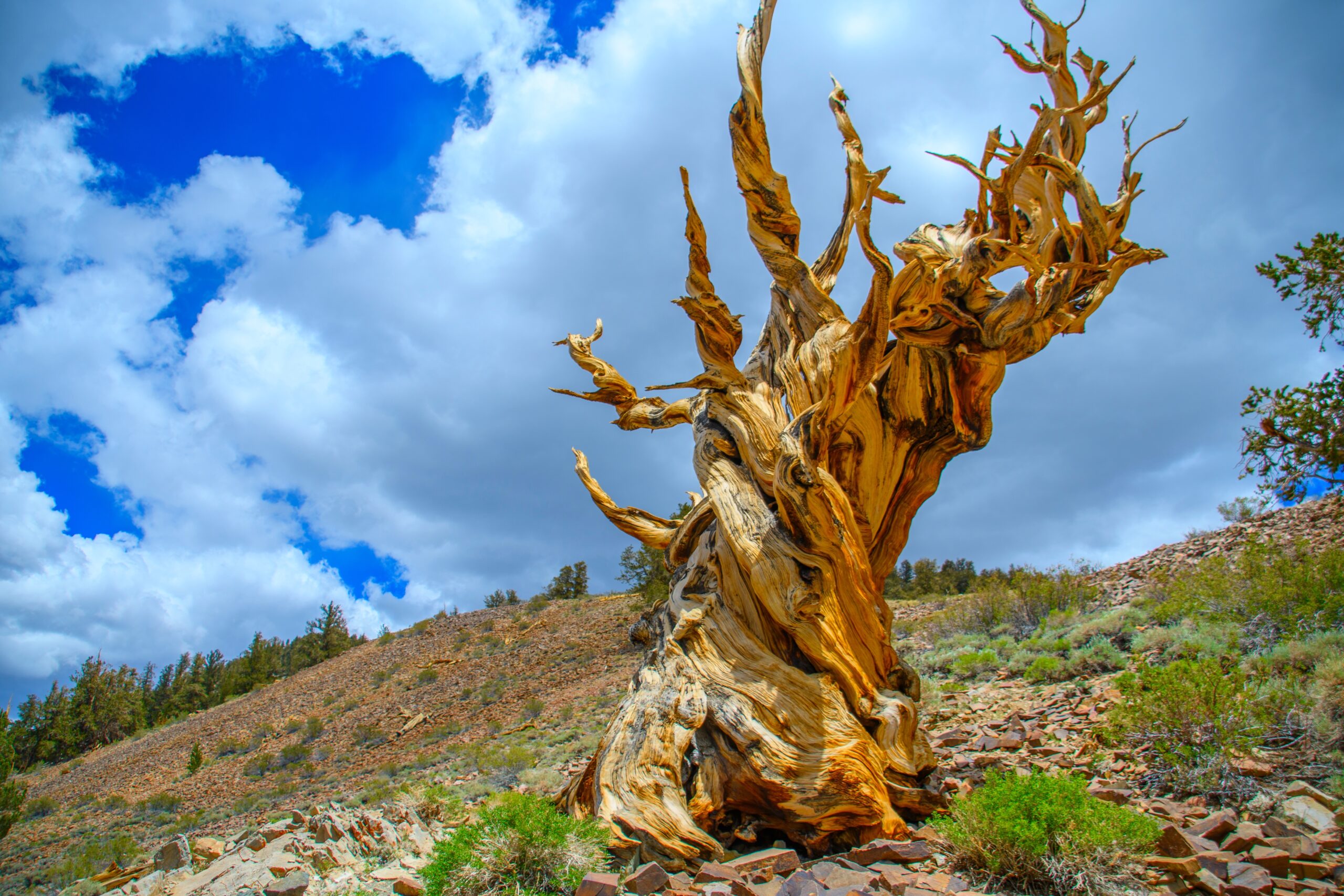The ocean is home to some of the most breathtaking creatures on the planet, many of which captivate with their vibrant and unforgettable colors. These marine animals are not only visually stunning but often use their dazzling hues for camouflage, communication, or protection. From radiant fish to brightly colored invertebrates, each creature plays a unique role in the underwater world. Exploring these vibrant marine species offers a glimpse into the incredible beauty and diversity that lies beneath the surface. Here are some of the most dazzling marine creatures with colors that are impossible to forget.
Mandarin Fish
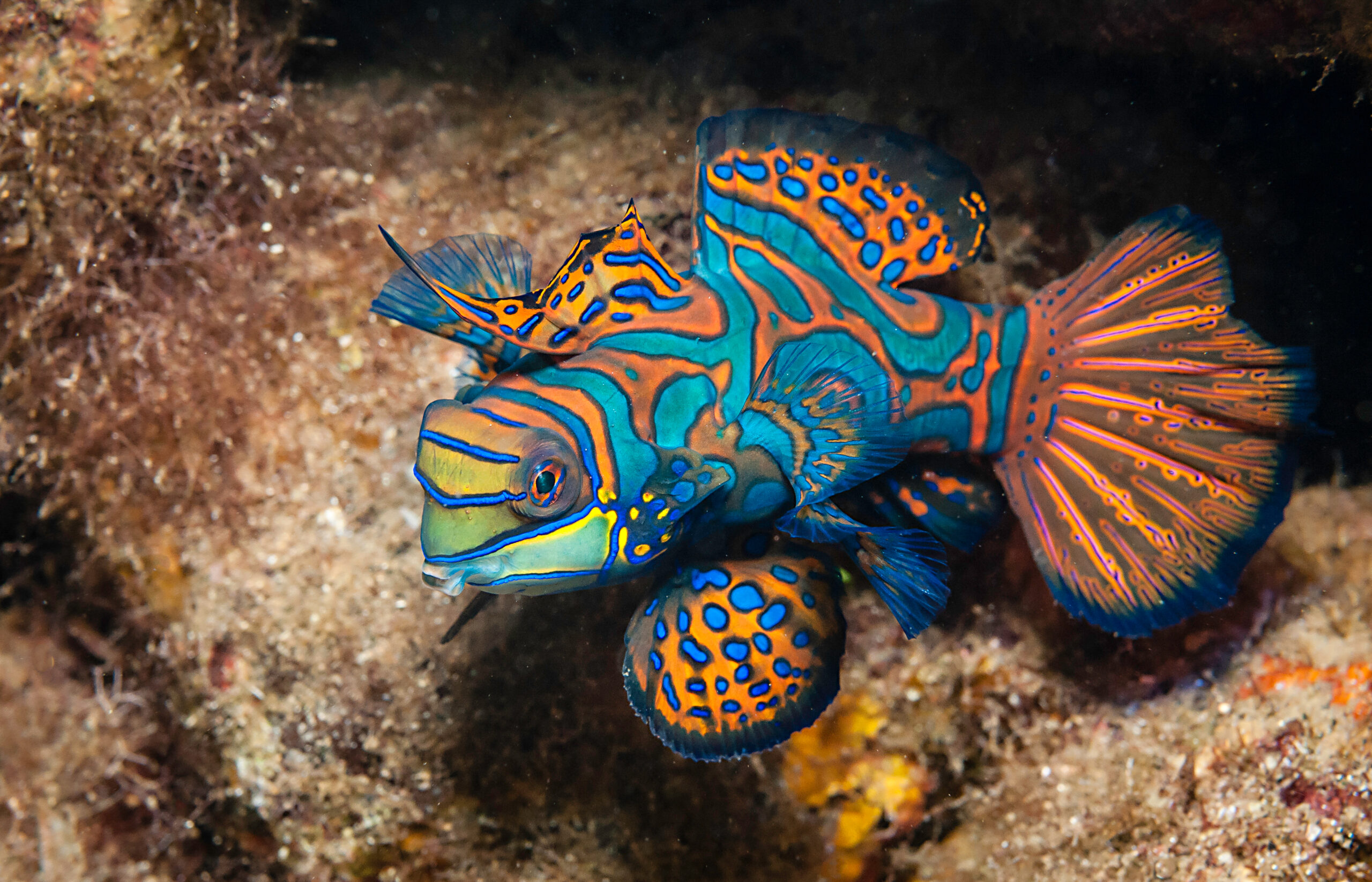
With its electric blue body and vibrant orange stripes, the Mandarin Fish is a mesmerizing spectacle in the warm waters of the Pacific. Often found hiding among coral reefs, this small, colorful fish thrives in shallow lagoons and coastal waters. Its skin is coated with a toxic mucus that deters predators, making it both beautiful and unapproachable. The intricate patterns on its body also help it blend seamlessly into its vibrant surroundings, adding an extra layer of defense. Its vivid hues and unique behavior make the Mandarin Fish a favorite among divers and underwater photographers.
Blue Dragon (Glaucus atlanticus)
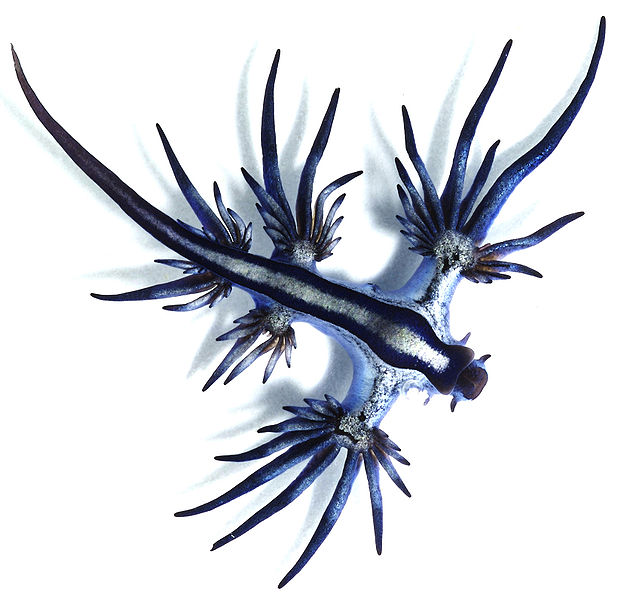
This stunning sea slug, often referred to as the Blue Dragon, is a remarkable blend of cobalt blue, silver, and dark blue. Floating on the ocean surface, it uses surface tension to stay afloat while drifting with the current. The Blue Dragon is known for feeding on venomous jellyfish, including the Portuguese Man o’ War, and stores the toxins in its body, using them for self-defense. Its delicate, wing-like appendages add to its ethereal appearance, making it seem as though it’s flying just beneath the water’s surface. Despite its tiny size, the Blue Dragon is a fascinating example of nature’s ability to combine beauty and danger.
Rainbow Parrotfish
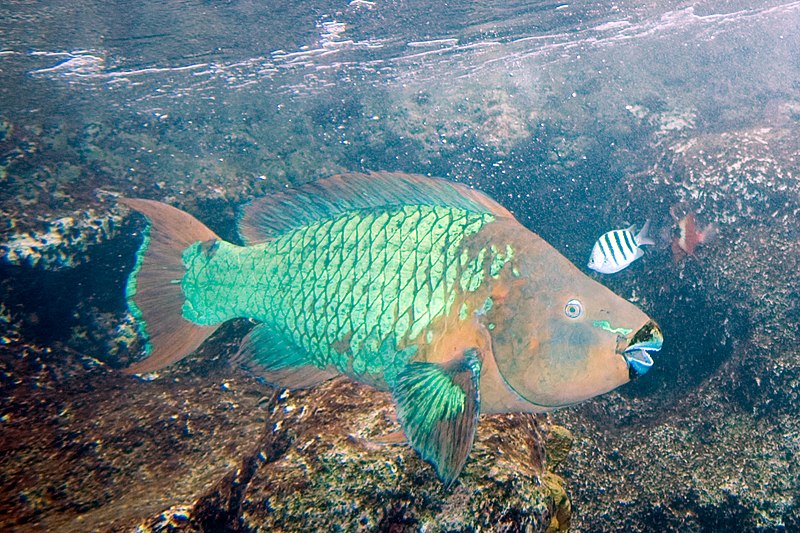
The Rainbow Parrotfish lives up to its name with a dazzling display of green, blue, orange, and yellow scales. Native to the Caribbean and the Atlantic coral reefs, this large fish can grow up to four feet in length, making it one of the biggest herbivores on the reef. It has a beak-like mouth that allows it to scrape algae off coral, playing a crucial role in keeping reefs healthy. As it swims, its vivid colors shimmer in the sunlight, creating a living rainbow in the ocean. Its bright appearance and ecological importance make the Rainbow Parrotfish a true underwater marvel.
Clown Triggerfish
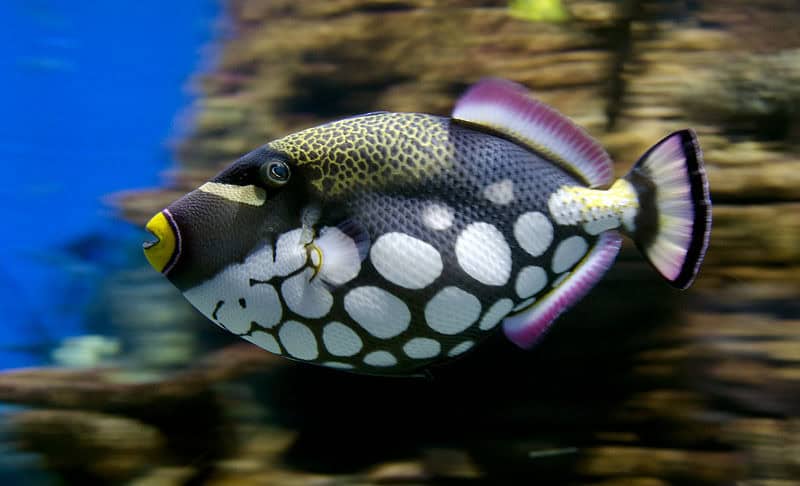
Bold and striking, the Clown Triggerfish is instantly recognizable by its black body dotted with large white spots, contrasted by a vibrant yellow face and fins. Found primarily in the Indo-Pacific region, this tropical fish uses its sharp teeth to crack open hard-shelled prey like sea urchins and crustaceans. It’s a highly territorial species, often aggressively defending its space from other fish. Its striking pattern not only helps deter predators but also makes it a popular sight for divers. The Clown Triggerfish’s combination of striking colors and distinctive behavior makes it a standout among reef inhabitants.
Nudibranch
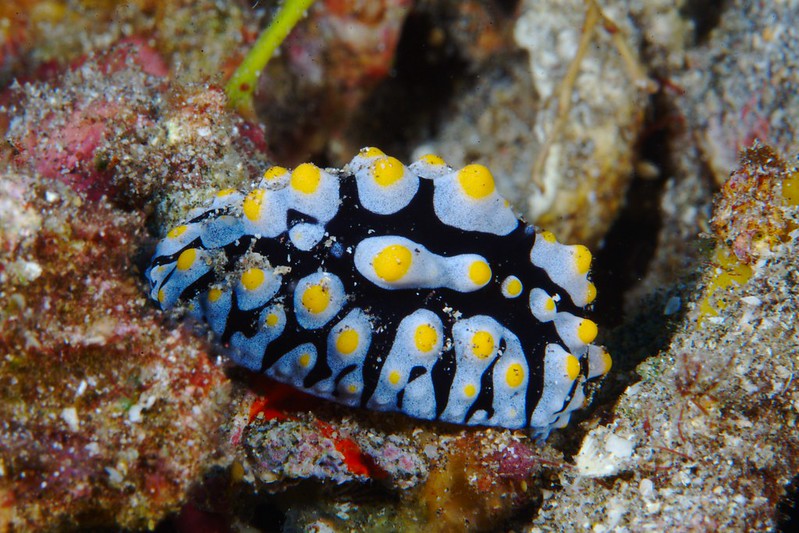
Nudibranchs, also known as sea slugs, are among the most vividly colored creatures in the ocean, with thousands of species displaying a wide array of bright, neon hues. These soft-bodied mollusks can be found in various environments, from shallow reefs to the deep ocean. Their vivid colors serve as a warning to potential predators that they are either toxic or unpalatable. Despite their delicate appearance, nudibranchs are voracious eaters, feeding on sponges, coral, and even other nudibranchs. Each species’ unique color pattern makes these creatures living works of art on the ocean floor.
Emperor Angelfish
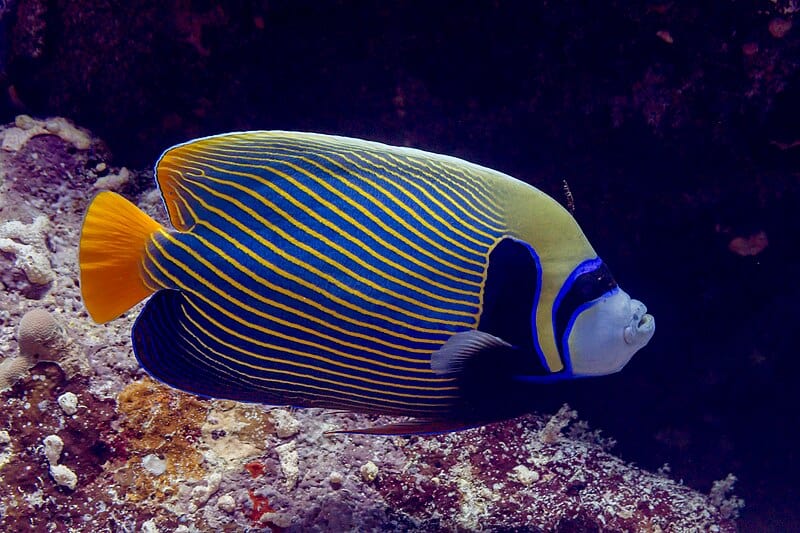
The Emperor Angelfish is a true aquatic masterpiece, with brilliant blue, yellow, and black stripes gracing its body. The juvenile Emperor Angelfish has a completely different appearance from its adult counterpart, sporting circular white and blue patterns that gradually transform into horizontal stripes as it matures. These fish are typically found in coral reefs across the Indian and Pacific Oceans, where their vivid coloring helps them blend into their vibrant surroundings. Emperor Angelfish are known to be territorial and can often be seen patrolling their patch of reef. Their dramatic color transformation and striking adult appearance make them one of the most recognizable fish in the ocean.
Peacock Mantis Shrimp
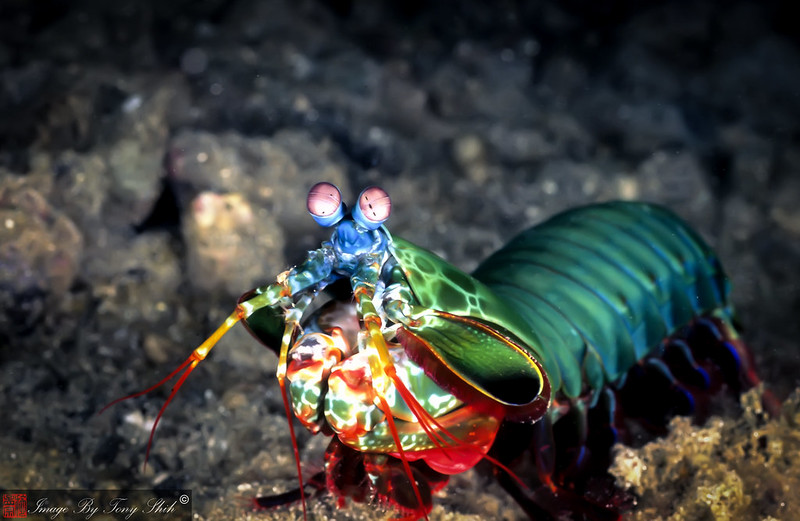
The Peacock Mantis Shrimp is a kaleidoscope of colors, with shades of green, blue, and red shimmering across its hard exoskeleton. Found in the warm tropical waters of the Indo-Pacific, this small but fierce crustacean is famous for its powerful club-like appendages, which it uses to punch prey at incredible speeds. The mantis shrimp’s eyes are among the most complex in the animal kingdom, capable of detecting polarized light and seeing a broader spectrum of colors than humans. Its vibrant appearance and fascinating hunting techniques make the Peacock Mantis Shrimp a true marvel of the ocean. Despite its small size, it’s one of the ocean’s most formidable hunters.
Flame Angelfish
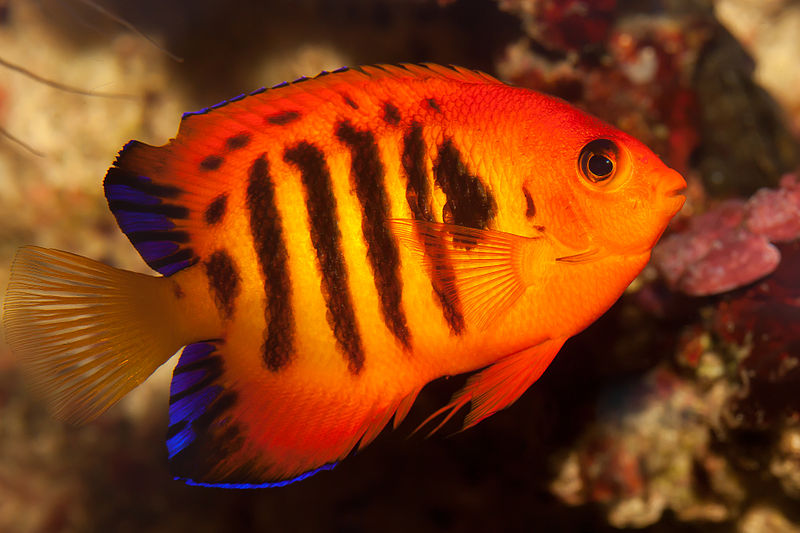
With its fiery orange body and contrasting vertical black stripes, the Flame Angelfish is a striking sight among the coral reefs of the Indo-Pacific. This small fish typically measures around four inches in length and is known for its agility and ability to dart quickly between coral formations. Its vivid colors help it blend into the coral and hide from predators, though it can be quite shy around divers. Flame Angelfish are often found in pairs or small groups, adding even more vibrancy to their surroundings. Their bright, flame-like appearance and lively behavior make them a favorite among marine hobbyists and reef enthusiasts.
Royal Gramma
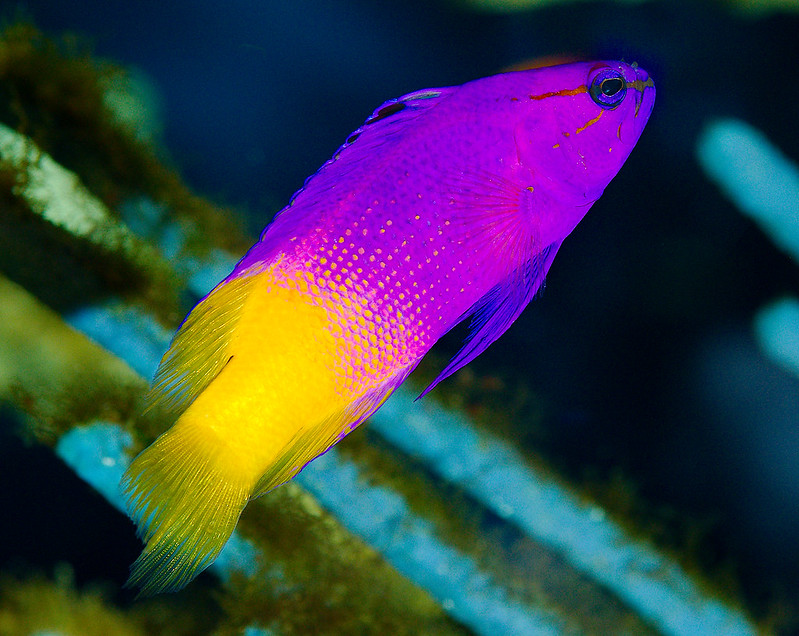
The Royal Gramma is a jewel of the Caribbean, showcasing a stunning two-tone color palette that shifts from deep purple on the front half of its body to a radiant yellow on the back. This small fish, usually only three inches long, spends most of its time hiding in caves and crevices within coral reefs. Its vivid colors serve as a deterrent to potential predators, signaling its territory and health. Despite its bold appearance, the Royal Gramma is a peaceful species that can often be found swimming gracefully through its home waters. Its simple yet striking coloration makes it a favorite in both the wild and in home aquariums.
Lionfish
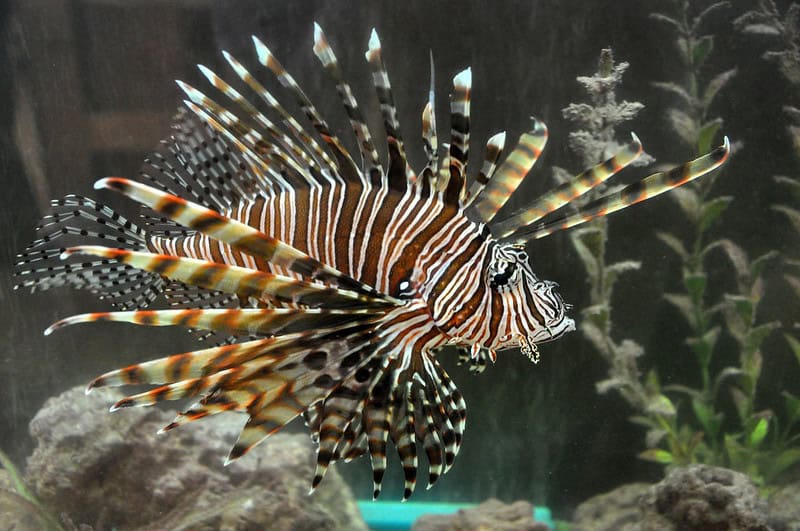
The Lionfish is a captivating blend of beauty and danger, with long, venomous spines and bold red and white zebra-like stripes. Native to the Indo-Pacific, these fish have spread to other regions, becoming an invasive species in places like the Atlantic. Despite their slow and graceful movement, lionfish are highly efficient predators, using their spines to corner and ambush prey. Their venomous spines are a powerful defense mechanism, making them dangerous to both predators and humans alike. While they may pose ecological threats, their exotic appearance and flowing fins make them one of the most admired fish in the ocean.
Moorish Idol
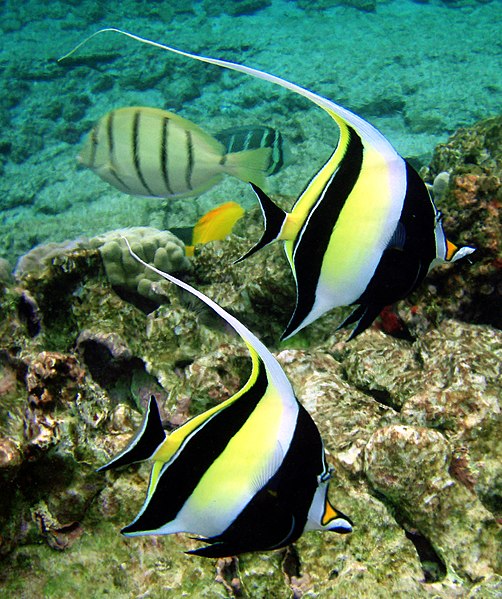
The Moorish Idol, with its striking black, white, and yellow bands, is one of the most graceful fish found in tropical reefs. Its elongated dorsal fin, known as a filament, adds an extra touch of elegance to its silhouette as it swims. Found in the Indo-Pacific and the Indian Oceans, this fish is notoriously challenging to keep in captivity due to its specific diet and social needs. In the wild, it can often be seen gliding effortlessly through coral gardens, feeding on sponges and other invertebrates. The Moorish Idol’s beauty and grace have made it a symbol of marine elegance in popular culture.
Blue Tang
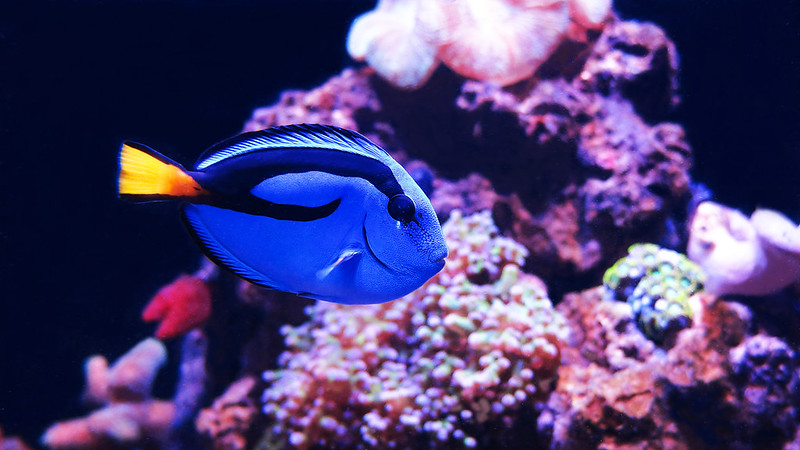
The Blue Tang, known for its vibrant blue body and yellow tail, is a popular fish in coral reef ecosystems and aquariums worldwide. Native to the Indo-Pacific, this fish plays a vital role in maintaining the health of coral reefs by feeding on algae that would otherwise smother coral. Despite its vibrant colors, the Blue Tang can change its hue when stressed or threatened, becoming pale to blend in with its surroundings. Its popularity surged after its appearance in animated films, making it one of the most recognizable fish in the world. The striking contrast of blue and yellow makes the Blue Tang a visual highlight in any reef environment.
Scarlet Cleaner Shrimp
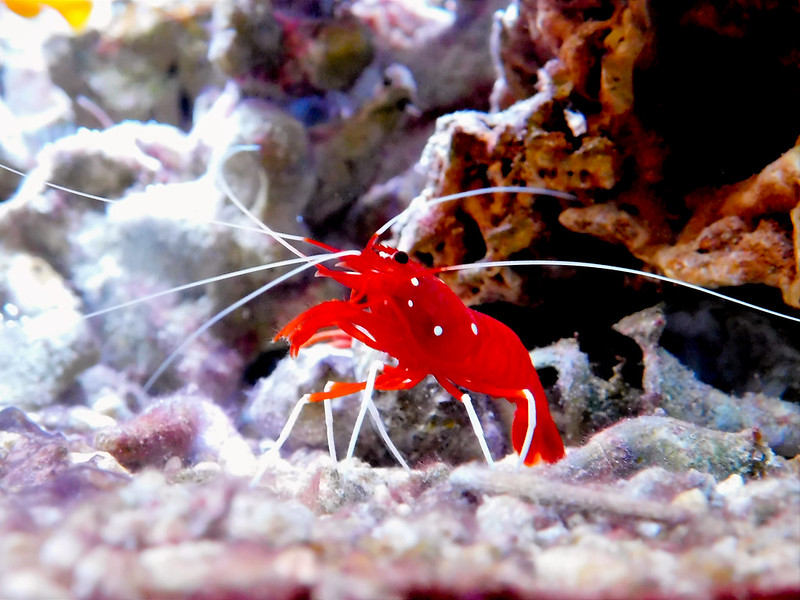
The Scarlet Cleaner Shrimp, with its bright red body and white stripe running down its back, is not just visually striking but also plays a crucial role in marine ecosystems. These shrimp are known for setting up “cleaning stations” on reefs, where they remove parasites and dead skin from fish that visit them. Often found in pairs, they are a peaceful species that contributes to the health and wellbeing of other marine animals. Their vibrant color helps them stand out, signaling their non-threatening nature to fish that seek their services. The Scarlet Cleaner Shrimp is a dazzling, helpful addition to any reef community.
Clownfish
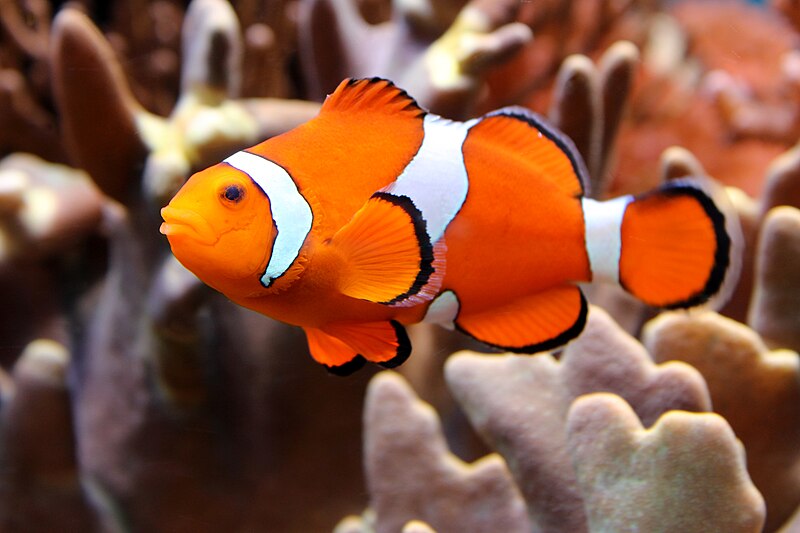
The Clownfish, made famous by its distinctive orange and white pattern, lives symbiotically with sea anemones, using their stinging tentacles for protection. Its bright colors serve as a stark contrast to its home environment, making it easy to spot. In return for the anemone’s protection, the Clownfish cleans the anemone and lures in prey. This fish is well-known for its bold personality, often darting in and out of the anemone’s tentacles. The Clownfish’s eye-catching colors and unique relationship with the anemone make it one of the most recognizable and beloved creatures of the reef.
Weedy Seadragon
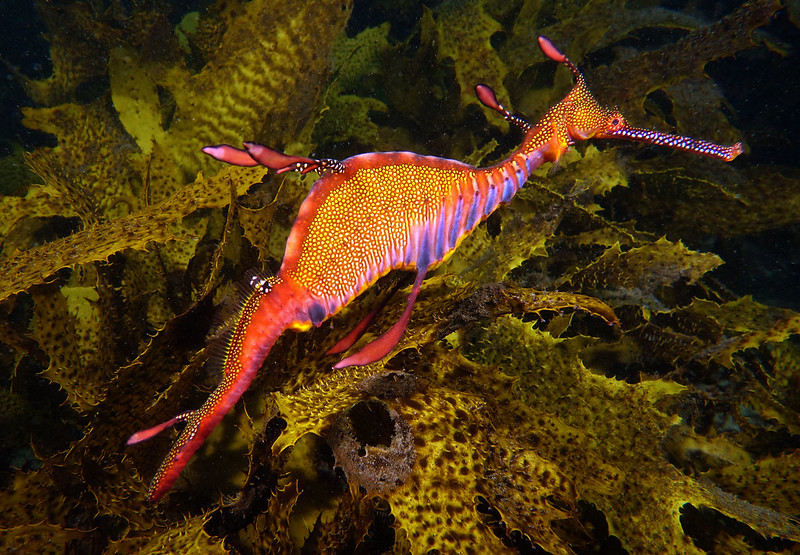
The Weedy Seadragon is a master of disguise, with leaf-like appendages that help it blend seamlessly into its kelp and seagrass habitat. Its long, slender body is adorned with shades of orange, red, and yellow, while its appendages mimic the surrounding vegetation. Native to the waters off southern Australia, this relative of the seahorse is a slow but graceful swimmer. Though it uses its camouflage to avoid predators, its vivid colors and unique shape make it an enchanting sight for divers. The Weedy Seadragon’s striking appearance and delicate movements give it an almost mythical quality in the underwater world.
This article originally appeared on Rarest.org.
More From Rarest.Org
When it comes to fashion accessories, belts can do more than just hold up your pants, they can transform an entire outfit. Designer belts, in particular, bring a touch of luxury and sophistication that instantly elevates your style. Read more.
Unique ecosystems flourish around the world, sustained by rare and fascinating plant life. These environments often adapt to extreme conditions, creating a delicate balance that supports life in unexpected ways. Read more.
Bespoke fashion services offer a personalized approach to style, focusing on unique designs tailored to your body and preferences. Each piece is crafted with attention to detail, making it truly one-of-a-kind. Read more.


